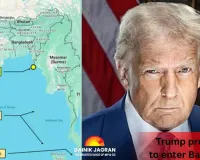Pakistan Airstrikes in Kabul: TTP Chief Noor Wali Mehsud Feared Killed; Taliban Denies Damage
Digital Desk

Pakistan launched aerial strikes on several Tehreek-e-Taliban Pakistan (TTP) hideouts in Kabul late Thursday night. According to Pakistani media reports, the air force claims to have killed TTP chief Maulana Noor Wali Mehsud during the operation.
Reports suggest Mehsud was present at a TTP base in eastern Kabul at the time of the strikes. He has been leading the group since 2018 and is accused by Islamabad of operating from Afghan soil under Taliban protection.
The timing of the strikes coincides with Afghan Foreign Minister Amir Khan Muttaqi’s official visit to India, where he is scheduled to remain for seven days.
Meanwhile, Afghanistan’s TOLO News reported receiving an audio message allegedly from Mehsud, in which he denied being targeted and claimed no attack occurred against him.
Who is Noor Wali Mehsud?
Born on June 26, 1978, in Ghurghur, South Waziristan, Noor Wali Mehsud is among Pakistan’s most wanted terrorists. After the death of Mullah Fazlullah, he assumed leadership of the TTP in 2018, becoming the group’s fourth chief.
According to defense analysts, Mehsud joined a jihadist network in 2003, which gained strength in Pakistan’s tribal belt during the Taliban regime. In 2007, the group became part of the Tehreek-e-Taliban Pakistan, under Baitullah Mehsud’s command.
By 2013, Mehsud was overseeing TTP’s operations in Karachi, running extortion and kidnapping networks to fund terrorist activities across Pakistan. He reportedly instructed Pashtun residents in Karachi to resolve their disputes through the group’s “Taliban courts,” often enforcing compliance through violence.
Intelligence agencies believe Mehsud frequently moved between Pakistan and Afghanistan, while still holding Pakistani citizenship.
TTP—Pakistan’s Most Persistent Security Threat
Since the Taliban’s return to power in Afghanistan in 2021, the TTP has intensified its guerrilla campaign against Pakistani security forces. For over a decade, it has been regarded as Pakistan’s most serious internal security threat.
Islamabad alleges that TTP militants receive training in Afghanistan before launching cross-border attacks. The Taliban government, however, denies supporting the group.
According to the Pakistan Institute for Peace Studies, terrorist incidents have surged to their highest level since 2015, largely due to TTP activities. As a result, Pakistan now ranks second globally among nations most affected by terrorism, per the Global Terrorism Index.
How the TTP Was Formed
The origins of the TTP trace back to 2001, following the US invasion of Afghanistan. Many militants fled across the border into Pakistan’s tribal regions. Pakistan’s support for the US-led campaign angered these groups.
In 2007, Baitullah Mehsud unified 13 militant factions to form the Tehreek-e-Taliban Pakistan. The group enforced strict Sharia law in tribal areas and carried out attacks on Pakistani security forces, foreign troops, and civilian targets, including schools, religious scholars, and urban centers.
Despite years of military operations and US drone strikes, the TTP was never fully dismantled.
Though Pakistan declared victory over the group in 2018, the resurgence of its attacks in recent years has proven otherwise.



.jpg)


1.jpg)
2.jpg)

1.jpg)
1.jpg)
